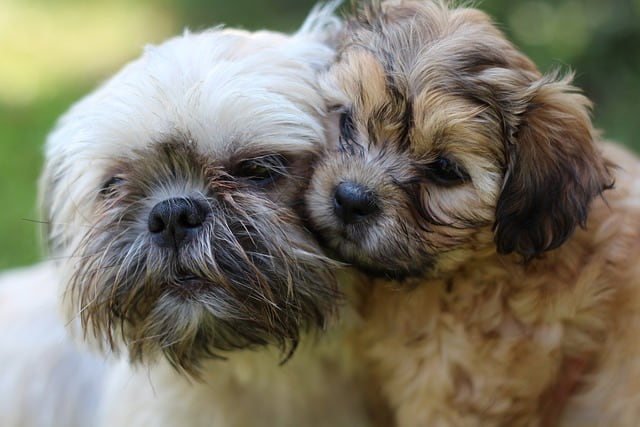If you’re considering getting a dog, you’ll have a wide variety of breeds, each with its unique traits and charm. Whether it’s the intelligence and energy of a Border Collie or the affection and cuteness of a Shih Tzu, every breed offers something special.
Take the time to research and consider factors like size, energy level, grooming needs, and temperament to find the perfect match that fits your lifestyle and preferences. Choosing the right breed will lead to a loving and fulfilling relationship with your new furry family member. Luckily enough, we have the essential factors that can help you make a smart decision.
Characteristics of a Border Collie and Shih Tzu
The Border Collie boasts high intelligence, boundless energy, and a strong work ethic, thriving with mental challenges and physical activities. Conversely, the Shih Tzu’s affectionate and playful nature makes them a perfect and delightful companion for families of all ages, offering a wonderful contrast to the Border Collie’s high intelligence and herding instincts.
| Characteristic | Border Collie | Shih Tzu |
|---|---|---|
| Size | Medium-sized (up to 45 pounds) | Small (9 to 16 pounds) |
| Coat Types | Smooth or short and coarse Rough or medium-length and feathered | Long, double-hair coat |
| Exercise Needs | Extremely energetic, requires lots of exercise and mental stimulation | Low exercise needs, suitable for apartment living |
| Intelligence | Highly intelligent, quick learners, responsive to commands | Intelligent, but not as quick to learn as Border Collies |
| Workaholic | Thrives on mental and physical stimulation, needs a job to do | Less work-oriented, enjoys play and companionship |
| Affectionate | Affectionate with family, loves to be around people | Affectionate, happiest when with family |
| Temperament | Alert, hardworking, can be reserved with strangers | Lively, friendly, outgoing, gets along well with people and other dogs |
| Trainability | Highly trainable, excels in dog sports, responsive to positive reinforcement | Trainable but may require more patience during housebreaking |
| Grooming | Regular grooming required for their double-coat | High-maintenance grooming, requires regular brushing and grooming |
Breed History
The Border Collie, an esteemed herding breed, traces its origins to the border region between Scotland and England. These intelligent dogs proved indispensable to flock owners, effectively managing vast sheep herds crucial to the early development of livestock farming and the wool trade throughout the United Kingdom and its territories. Over time, the breed adapted to the diverse demands of the far-flung wool trade, resulting in variations in Border Collies today.
In stark contrast, the history of the Shih Tzu dates back over a millennium, meticulously bred by Tibetan monks as companions for the Chinese royals. These lion-like holy dogs, known as “foo” were highly prized, and their scarcity led the Chinese to withhold them from being sold, traded, or given away for years. Eventually, the first Shih Tzu dogs arrived in Europe in the 1930s, classified as “Apsos” before being officially recognized as Shih Tzu.
Brought into the United States by returning military personnel in the late 1940s and 1950s, the Shih Tzu gained popularity through carefully curated breeding programs.
Today’s Shih Tzu can trace their ancestry to thirteen dogs imported into England and Scandinavia between 1928 and 1952, with a notable addition of a black and white Pekingese in 1952.
Appearance Comparison
When contrasting the visual features of a Border Collie and a Shih Tzu, it becomes evident that their size and physical characteristics set them apart in distinct ways.
Size Comparison
Border Collies are renowned as medium-sized dogs cherished for their herding prowess and abundant energy. To clarify the size details, male Border Collies typically stand 19 to 22 inches tall and weigh between 35 and 45 pounds, while females are slightly smaller, measuring 18 to 21 inches tall and weighing 30 to 40 pounds.
In contrast, Shih Tzus are generally uniform in size regardless of gender. Typically, male Shih Tzus are taller and heavier than females, with a weight difference of around 2 to 3 pounds. According to studies, male and female Shih Tzus usually weigh between 9 and 16 pounds, and their wither height is approximately 10 inches. As a small dog breed, Shih Tzus usually stand between 9 to 10 ½ inches tall and weigh nine to 16 pounds, regardless of gender.
Coats & Colors
The Border Collie is recognized for its diverse coat colors, with some of the standard colors approved by the AKC are black, blue, blue merle, red, red merle, and sable, often combined with white. The breed boasts a double coat, featuring a longer and thicker rough coat and a shorter and sleeker smooth coat.
Shih Tzus are available in numerous colors and patterns, including black, white, gold, brown, and gray/silver. It’s uncommon to find pure-black or solid-white Shih Tzus. Their coats may change color as they age, and the presence of diverse markings and patterns contributes to their popularity.
In summary, both breeds exhibit a wide range of coat colors and markings, each contributing to their unique appeal to dog lovers. The Border Collie’s coat can vary from black and blue to merle and sable, while the Shih Tzu can come in shades like black, white, blue, and red, often featuring striking patterns like tuxedo and saddle. These diverse coat variations add to the charm and allure of these beloved dog breeds.
Personality & Temperament Difference of a Border Collie and Shih Tzu
The Border Collie and Shih Tzu are two distinct dog breeds, each known for its unique set of qualities. The Border Collie is renowned for its exceptional intelligence, agility, and herding abilities, while the Shih Tzu is loved for its friendly and affectionate temperament, making it an ideal companion.
Dogs towards Family

Border Collies are highly energetic and athletic dogs that require an active lifestyle and mental stimulation to thrive. They are well-suited for families who enjoy outdoor activities and can provide ample opportunities for exercise and play.
Shih Tzus are bred to be affectionate and loyal companions, making them great indoor pets for families seeking constant love and companionship. They adapt well to various living arrangements and enjoy being close to their human family members.
Both breeds have unique qualities that cater to different family dynamics. Border Collies are best suited for active families, while Shih Tzus are perfect for those seeking affectionate indoor companions. Regardless of the breed, providing love and attention is essential for building a strong bond with these wonderful canine companions.
Kids
When considering the compatibility of Border Collies with kids, essential factors come into play. Due to their strong herding instincts and work ethic, Border Collies may struggle to get along with small children. Experts recommend waiting until children are at least six years old before introducing them to a Border Collie.
Consistent training and socialization are essential to fostering a positive relationship, exposing the dogs to kids from an early age. Teaching obedience commands can also help them interact kindly and amicably with children. Equally important is educating children on appropriate behavior with the dog, discouraging actions like riding, pulling on their tails or ears, or any form of harassment. Such behavior may scare the Border Collie and affect trust.
Shih Tzus are generally well-suited for kids, making wonderful companions. Their affectionate and tender nature makes them particularly kid-friendly. Shih Tzus are known to be protective and curious, approaching children with caution. They are highly intuitive and gentle with kids, making them a great addition to homes with children.
While Border Collies can have varying relationships with kids due to their herding instincts, patience, training, and appropriate interactions can foster a positive bond. Shih Tzus are generally excellent with children. They are affectionate, protective, and kid-friendly, making them suitable for families seeking a furry companion for their little ones.
Other People
Border Collies are generally not naturally aggressive, although certain situations can trigger aggressive behavior. They may display aggression towards strangers or individuals they don’t trust. This could be due to poor socialization or lack of early interaction with other dogs, causing them to perceive other canines as threats and react aggressively. Additionally, Border Collies’ territorial instincts can make them unwelcoming to unfamiliar people entering their space.
Shih Tzus are typically not considered aggressive dogs, but exceptions exist. Growling in a Shih Tzu might indicate aggression but can also be a warning sign of discomfort or fear. These dogs may also become protective of their space, barking at anyone approaching you or their territory. Creating positive associations between the dog and the person they react to can help address aggressive behavior aggressively. Owners can ensure a harmonious relationship with their pets by understanding these tendencies and employing appropriate training methods.
Dogs & Other Animals
Border Collies are known for their herding instincts and protective nature, which can influence their interactions with other dogs and animals. Their defensive tendencies may cause them to view other dogs as potential threats and lead them to bark or growl to create distance. While not inherently aggressive, Border Collies’ energetic nature can lead to barking at other dogs. The compatibility between a Border Collie and another dog often depends on the personalities and temperaments of both dogs.
Shih Tzus are generally non-aggressive and display high tolerance towards other dogs. They are affectionate, cheerful and enjoy being around people, making them excellent house pets. They typically get along well with individuals of all ages and are friendly toward other dogs and pets. However, it is essential to be cautious when introducing them to smaller animals like hamsters or guinea pigs, as they may have a playful chase instinct that could accidentally harm these smaller creatures. Shih Tzus make excellent family pets and are usually well-suited for households with children.
Having said that, Border Collies and Shih Tzus have different traits influencing their interactions with other dogs and animals. Border Collies may be protective and energetic, while Shih Tzus are generally tolerant and friendly. The compatibility between these breeds and other animals can be improved through socialization and understanding their instincts. Both breeds have unique qualities that make them great companions for families, but proper introductions and monitoring are necessary for harmony between them and smaller pets.
Behavior Issues
Border Collies and Shih Tzus have distinct behavioral traits requiring proper attention and training. Border Collies are known for their high energy levels and intelligence, but without adequate physical and mental stimulation, they may develop destructive behaviors such as chewing, digging, and excessive barking. Moreover, their natural herding instincts can lead to potentially dangerous behaviors like nipping at the heels of children or attempting to herd cars. Consistency is crucial when training Border Collies, as inconsistency can result in confusion and unwanted actions.
Shih Tzus can experience various behavior issues, often stemming from normal dog behavior gone astray, genetics, or environmental factors. Excessive barking in Shih Tzus can signify boredom, anxiety, or a desire for attention from their owner. Their independent and strong-willed temperament may make them resistant to training and following commands.
Additionally, separation from their owner can lead to distress and anxiety, leading to destructive behaviors and excessive vocalization. Shih Tzus’ aggressive behavior can be triggered when protecting their food or out of a desire to safeguard their owner. These people-oriented dogs may exhibit attention-seeking behavior when not given enough love and affection, manifesting through whining, barking, or constant following.
Both breeds require proper training, mental stimulation, and consistent handling to prevent behavioral issues and foster a harmonious relationship between the dogs and their owners. Owners can ensure a happy and well-behaved companion by understanding and addressing their specific needs.
Training & Exercise
Border Collies, known for their intelligence and activity, require 1 to 2 hours of exercise daily. Activities like walking, running, and hiking in nature can keep them physically and mentally stimulated. Herding trials and agility training are excellent ways to engage their instincts while having fun. Swimming is a low-impact option for their joints. Mental challenges through games like hide-and-seek and puzzle toys also keep their minds sharp.
As for Shih Tzus, they need regular exercise for their well-being. Two walks of 20 to 30 minutes each day or three short walks of 15 minutes can be sufficient. Engaging the dog with known exercises is recommended to keep them interested. It’s important to remember that every dog is different, and seeking guidance from a vet or professional trainer can ensure the best exercise and training routine for your Shih Tzu.
Grooming Comparison between Border Collie and Shih Tzu

Grooming is a crucial aspect of pet care that varies significantly among dog breeds. Some breeds require minimal maintenance, while others demand more extensive grooming routines to keep their coats in top condition.
In this context, the Border Collie and Shih Tzu stand in stark contrast, each having unique grooming needs. The Border Collie is known for its ease of grooming, thanks to its shorter coat, while the Shih Tzu’s long and thick fur necessitates diligent and regular grooming to avoid matting and tangling.
Shedding
Border Collies have luscious thick coats and shed moderately throughout the year. Shedding season is throughout spring and fall when the shedding becomes more noticeable as they transition between their winter and summer coats. Regular brushing, about two to three times a week, can help manage the shedding.
Shih Tzus are generally considered light shedders. They have long, silky hair and shed only a small amount, mostly noticed during grooming or washing. While Shih Tzus are often considered a non-shedding breed, they do shed their undercoat during spring and fall due to being double-coated dogs. Additionally, Shih Tzu puppies experience a temporary increase in shedding around their first birthday, but it’s a short phase that can be managed with regular brushing.
Health of a Border Collie versus Shih Tzu
Border Collies and Shih Tzus are known for their generally robust health, but like all breeds, they may be susceptible to specific health concerns. While these breeds are typically energetic and resilient, owners must be aware of potential health issues affecting their beloved pets.
Life Span Comparison
Border Collies, on average, have a lifespan ranging from 10 to 17 years, with most living around 12 to 15 years. However, exceptional cases have been reported where some Border Collies defied the odds and reached an impressive age of 18 or 25.
When compared to breeds of similar size, the median life expectancy of Border Collies is generally between 12 and 13 years, showcasing their relatively robust health.
Shih Tzus, a small breed of dog, are known for their comparatively long lifespan, from 10 to 18 years on average. Remarkably, some Shih Tzus have exceeded this range and lived even longer. A heartwarming example is Smokey, a Shih Tzu from Florida, who holds the record for the oldest living Shih Tzu at an incredible 23 years old.
These variations in lifespan emphasize the individuality and uniqueness of each dog. While averages provide a rough estimate, genetics, environment, and proper care significantly determine how long our beloved canine companions will be with us. Cherishing every moment with them is vital, as each day is a gift that cannot be taken for granted.
Diet & Nutrition
Border Collies need a balanced diet suitable for their high energy levels. Feed them high-quality animal-based proteins similar to:
- Beef
- Chicken
- Turkey
- Lamb
- Duck
- Eggs
- Fish
Make sure to feed them at least twice a day. Ideally, aim for 25 to 30% protein and 15 to 20% fat in their diet, and include healthy fats from fish and flaxseed oils. Avoid grains, opting for carbs from vegetables, herbs, and berries, limited to 10 to 15% of their diet. Several supplements can be beneficial for your dog, like fish oil and kelp. For a natural and nutrient-rich option, consider a raw diet with raw meat, vegetables, meaty bones, fish, and dairy.
Shih Tzus need a well-balanced diet with protein, carbs, essential fatty acids, vitamins, and minerals. Provide high-quality protein from chicken, beef, or fish to support their overall health. Offer healthy carbohydrates like sweet potatoes, oats, rice, and barley for sustained energy throughout the day. Incorporate vegetables to ensure they receive essential vitamins and minerals for optimal health.
Consider their specific calorie needs based on their life stage:
- Older dogs and puppies need around 280 calories
- Adults require about 340 calories
- Very active dogs may need up to 540 calories daily
Avoid overfeeding to prevent obesity, a common issue in Shih Tzus. Choose dog food brands designed for Shih Tzus, for a quality diet without fillers or artificial ingredients tailored to their nutritional requirements.
Health Issues
Border Collies, like all dog breeds, are typically in good health but can still be prone to specific health problems.
- Hip dysplasia: Border Collies may develop hip dysplasia, a condition where the hip joint’s ball and socket do not fit properly, leading to inflammation, pain, and arthritis over time.
- Epilepsy: Border Collies are susceptible to canine epilepsy, a neurological disorder that causes sporadic seizures.
- Collie Eye Anomaly(CEA): This genetic eye disease can potentially cause blindness in Border Collies. Regular eye checkups by a veterinarian are essential.
- Dental problems: Due to their chewing habits, Border Collies are prone to dental issues such as tartar and plaque buildup, leading to gum disease and tooth loss.
- Hypothyroidism: Some Border Collies may suffer from hypothyroidism, a condition where the thyroid gland doesn’t produce enough hormones, resulting in weight gain and lethargy.
Maintaining a healthy diet, regular exercise, and routine veterinary checkups are crucial to prevent and address common health concerns in Border Collies. If any worrying symptoms or illnesses arise, immediate consultation with a veterinarian is recommended.
Shih Tzus are generally considered to be sturdy and resilient dogs; however, they do have certain characteristic breed traits that can make them susceptible to particular health issues.
- Respiratory concerns: Shih Tzus belong to the brachycephalic breed, characterized by shorter snouts and flatter faces, leading to issues like snoring, snorting, and vulnerability to overheating. Additionally, they are susceptible to Brachycephalic Obstructive Airway Syndrome (BOAS), which can impede their breathing.
- Ocular issues: Shih Tzus are prone to eye abnormalities, including proptosis (eyeball displacement) and other eye diseases. It is crucial to monitor their eye health closely and promptly seek veterinary attention if any problems arise.
- Joint problems: Shih Tzus are predisposed to hip dysplasia and patellar luxation (dislocated kneecap), causing discomfort and mobility difficulties.
- Dermatological concerns: Shih Tzus are sensitive to allergens, often developing allergies that manifest as itching, skin irritations, and dermatitis. Vigilance in maintaining their skin health is essential.
- Ear troubles: Similar to many floppy-eared breeds, Shih Tzus are highly prone to ear infections, triggered by allergies, underlying conditions, or excessive moisture in the ear canal.
It is essential to recognize that while not all Shih Tzus may encounter these problems, they are prone to experiencing the mentioned health issues. Reputable breeders take measures to screen their dogs for the more prevalent conditions. If you observe any health concerns in your Shih Tzu, it is crucial to seek veterinary assistance promptly.
Comparing Cost
The cost of acquiring a Border Collie or a Shih Tzu can fluctuate significantly based on various factors, including the geographical location of the buyer and seller, the breed’s popularity in that region, the dog’s lineage, pedigree, and potential for show or breeding, as well as the overall demand and availability of the breed in the market.
Puppies

The average price of a Border Collie puppy is around $700, but reputable breeders may charge between $700 and $2,000. Purebred Border Collie puppies with a strong pedigree can cost between $1,000 and $2,500, depending on factors like bloodline and coat color. Family pet-oriented Border Collies can range from $500 to $1,800.
For Shih Tzu puppies, prices vary based on the breeder. Reputable breeders may charge between $500 and $1,800 for a Shih Tzu puppy, while some show-quality ones can go up to $5,000. Teacups or miniature Shih Tzus can cost approximately $1,500 to $2,000. Rescue Shih Tzus might cost around $350, but caution should be exercised with cheap puppies from sources like Craigslist as they may lack proper veterinary care and health testing.
Generally, a Shih Tzu puppy can range from $250 to as high as $3,000 for a top-quality puppy. The average price for a Shih Tzu puppy from a reputable breeder falls between $1,000 and $1,800.
Breeders & Centers
The price of a Border Collie can differ based on various factors, including where the breeder is located and their reputation, the dog’s pedigree, and the size of the litter. If you’re looking for a purebred Border Collie with papers from a reputable breeder, you can expect to pay between $1,500 and $2,500. However, a purebred Border Collie from a champion bloodline may cost around $4,000, while a well-trained premium Border Collie could be as high as $7,500.
If you’re on a budget, adopting a Border Collie from a rescue organization or shelter is more affordable, with fees typically ranging from $200 to $500. These fees usually cover initial vaccinations, spaying or neutering surgery, and a microchip.
Similarly, the cost of a Shih Tzu can vary depending on factors like supply and demand, location, and the breeder’s reputation. Professional breeders who produce Shih Tzu puppies from top lineages or litters of proven show dogs generally charge a higher price, with some reaching up to $6,000. Prices can increase substantially if the parents are show-quality dogs from a reputed breeder; as such, breeders invest more in caring for their breeding dogs and puppies to ensure the pets are healthy.
Which Better For Me, Border Collie or Shih Tzu?
When choosing a furry companion, it’s essential to consider various factors and not just rely on the notion of a “better” breed.
Border Collies are renowned for their exceptional intelligence and agility, making them highly trainable and suitable for various dog sports and activities. They thrive in active households with owners who enjoy providing mental and physical stimulation. Their high energy levels require regular exercise and mental challenges to keep them happy and prevent behavioral issues.
Shih Tzus are small, affectionate dogs known for their laid-back nature and low exercise requirements. They are content with short walks and playtime, making them ideal companions for individuals or families with a less active lifestyle. Their fluffy coats require regular grooming to keep them looking their best.
It’s vital to assess your lifestyle, living situation, and the time you can dedicate to a pet before deciding. A Border Collie may be the perfect choice if you are an active person seeking a devoted, intelligent partner for outdoor activities. However, if you prefer a cuddly, low-energy lapdog that thrives in indoor settings, a Shih Tzu might be a better fit.
Remember, every dog is an individual, and while breeds may have general traits, there can be variations within each breed. Take the time to meet and interact with different dogs of both breeds to gauge compatibility before committing. Ultimately, finding the right companion depends on your willingness to meet their needs and provide a loving home, regardless of breed.



